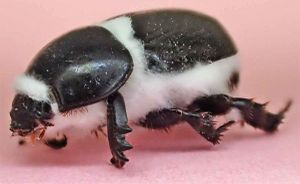Difference between revisions of "Beauveria (anamorphic genus - entomopathogens)"
| Line 1: | Line 1: | ||
{{TaxLinks|LnkHypocrealesEntomopathogens}} | {{TaxLinks|LnkHypocrealesEntomopathogens}} | ||
| − | {{ | + | {{LiteratureDBY|{{PAGENAME}}|21|browse,Dcountrylnk,QhostsP}} |
[[File:Beauveria pseudobassiana MycolProgr 2021.jpg|300px|thumb|''Heteronychus arator'' killed by ''Beauveria pseudobassiana'' (click on image to enlarge it)<br/>Authors: Laura F. Villamizar et al.<br/>Source: [https://doi.org/10.1080/21501203.2020.1754953 Mycological Progress (2021), vol. 20 p. 113]]] | [[File:Beauveria pseudobassiana MycolProgr 2021.jpg|300px|thumb|''Heteronychus arator'' killed by ''Beauveria pseudobassiana'' (click on image to enlarge it)<br/>Authors: Laura F. Villamizar et al.<br/>Source: [https://doi.org/10.1080/21501203.2020.1754953 Mycological Progress (2021), vol. 20 p. 113]]] | ||
'''<font color="#008000">''Beauveria'' (entomopathogens)</font>''' Vuill. 1912 | '''<font color="#008000">''Beauveria'' (entomopathogens)</font>''' Vuill. 1912 | ||
Latest revision as of 11:48, 24 November 2022
| Literature database |
|---|
| 1591 articles sorted by: |
| • year (descending) |
| • research topics |
| • countries/regions |
| • list of pest species |

Authors: Laura F. Villamizar et al.
Source: Mycological Progress (2021), vol. 20 p. 113
Beauveria (entomopathogens) Vuill. 1912
This genus is a widespread group of entomopathogenic fungi with around 20-30 species. They infects most types of insect pests and are found in many environments. The conidiogenous cells have a swollen basal part and a characteristic "zig-zag" rachis. The spores are white (white muscardine).
The genus is economically important for the microbial control of insect pests and is widely used, in particular Beauveria bassiana which, however, should be considered a species complex. The genus is are related to the genus Cordyceps and part of the family Cordycipitaceae.
For taxonomic reviews of the genus see Kepler et al., 2017 and Rehner et al., 2011.
Type species: Beauveria bassiana
Currently, the following species have been entered into the system: